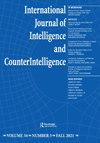Complexity in Military Intelligence
IF 0.5
Q4 INTERNATIONAL RELATIONS
International Journal of Intelligence and Counterintelligence
Pub Date : 2023-05-30
DOI:10.1080/08850607.2023.2209493
引用次数: 1
Abstract
Intelligence studies missed social science’s “complexity turn” more than twenty years ago. The aim of this article is to examine military intelligence from a complexity science perspective and discuss related concepts such as sensemaking and reflexivity. For this, military and intelligence theory, doctrine, and practice are studied. Complexity insights from military sciences are used to review mental models and current thinking in military intelligence. Rather than viewing it as a clearly defined and autonomous field or function embodied by a closed intelligence cycle, military intelligence is best seen as a situated practice. This situatedness is illustrated in two cases regarding vertical and horizontal contextual influences. First, a discussion of North Atlantic Treaty Organization deployments in Afghanistan shows important vertical influences: the impact of (political) context and task. Second, a review of United Nations missions exemplifies the horizontal dimension: the need for informal collaboration, ad hoc organization, and a holistic approach. However, both cases show vertical and horizontal influences. Overall, this article stresses the applicability of sensemaking rather than the intelligence cycle and makes suggestions for further incorporating complexity research into intelligence.军事情报的复杂性
二十多年前,智力研究错过了社会科学的“复杂性转向”。本文的目的是从复杂性科学的角度来审视军事情报,并讨论相关的概念,如语义和反身性。为此,研究军事情报理论、理论和实践。军事科学的复杂性见解用于审查军事情报中的心理模型和当前思维。与其将军事情报视为一个由封闭的情报循环所体现的明确界定和自主的领域或功能,不如将其视为一种情境实践。这种情境性在两个关于垂直和水平语境影响的案例中得到说明。首先,对北大西洋公约组织在阿富汗部署的讨论显示了重要的纵向影响:(政治)背景和任务的影响。第二,对联合国特派团的审查说明了横向方面:需要非正式合作、特设组织和整体办法。然而,这两种情况都显示出垂直和水平的影响。总体而言,本文强调了语义构建的适用性,而不是智能周期,并提出了进一步将复杂性研究纳入智能的建议。
本文章由计算机程序翻译,如有差异,请以英文原文为准。
求助全文
约1分钟内获得全文
求助全文
来源期刊

International Journal of Intelligence and Counterintelligence
INTERNATIONAL RELATIONS-
CiteScore
1.00
自引率
22.20%
发文量
102
 求助内容:
求助内容: 应助结果提醒方式:
应助结果提醒方式:


